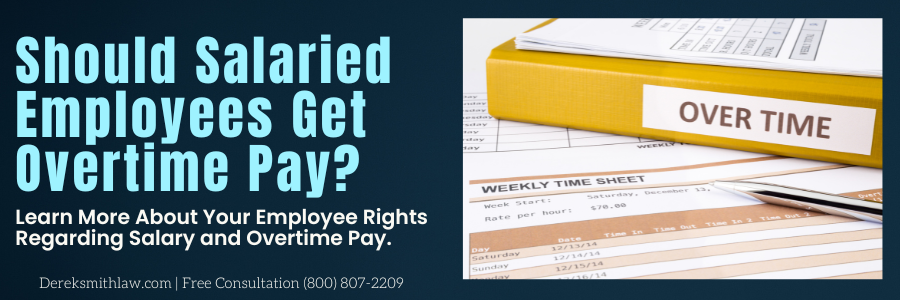Learn how salaried employees may be entitled to overtime pay for hours worked over 40 hours per week.

Many employees may get confused about whether they deserve overtime pay as salaried employees. The truth is typically a salaried employee is exempt from overtime pay. However, the issue that should be discussed is whether these salaried employees should actually be paid an hourly rate, as opposed to a salary.
When an employee receives hourly pay, they are entitled to overtime pay. Yet, many employers will misclassify employees as salaried employees to avoid paying their staff overtime wages. This practice is a violation of employment laws and wage and hour laws. As a result, employees entitled to overpay will be entitled to a retroactive repayment of employee wages as well as penalties.
Read on to learn how wage and hour law dictates which employees should be hourly employees eligible for overtime pay and which employees should be salaried employees, exempt from overtime pay.
When Can an Employee be Exempt from Overtime Pay?
An employee can be exempt from overtime pay when they are properly classified as a salaried employee. One of the requirements is how much an employee earns. An exempt employee must earn at least $455 a week. If they earn less than this amount per week, they must be paid as an hourly employee.
However, pay is only a small factor in determining if an employee is exempt. The Fair Labor Standards Act (FLSA) includes very specific terms regarding employee wages and classification. In order to be a salaried or exempt employee, the job duties must fit into one of the following categories:
- An executive must supervise at least two or more employees, have management as one of the primary duties of their job, and have a say in the employment status of employees.
- An exempt professional must have knowledge that involves specialized training and usually includes a college education or above. It cannot be a person with general technical skills that can be learned in a trade school or high school. Professionals may also include creative individuals, such as writers, actors, musicians, artists, and those who are part of the creative and inventive process.
- Administrative employees who are in relatively high paid positions that help keep the business running smoothly. For example, an executive assistant to the CEO of a company may be a salaried employee under the administrative employee rule.
If an employee does not fit any of these three categories or earns less than $455 a week, they are non-exempt, or hourly, employees.
Can Hourly Employees Become Salaried Employees When They Earn More than $100,000 a year?
Many employers believe that if an employee earns more than $100,000 a year, they are automatically exempt. As a result, they classify these employees as salaried employees and exclude them from overtime pay.
However, the FLSA only specifies a minimum amount of money an employee must earn to be considered exempt. It does not specify a maximum income for employees to be considered exempt.
Therefore, employees may earn over $100,000 a year through their hourly employee wage and still be qualified to earn overtime pay. They do not automatically become salaried employees because they earned more than $100,000 in a given year. Furthermore, an employer can not decide to withhold overtime pay for hourly employees earning over $100,000 a year under any circumstances.
Can a Salaried Employee Ever Earn Overtime Pay?
Salaried employees are exempt from overtime pay under all circumstances. However, some employers may volunteer to pay salaried employees bonuses for working overtime hours. They may also choose to provide additional vacation days or other benefits to exempt employees who consistently work overtime hours.
Alternatively, salaried employees cannot get docked pay for working fewer than 40 hours per week. Salaried employees are paid the same salary whether they work 40 hours, 60 hours, or 25 hours in a particular week. As long as an exempt employee conducts any kind of work on a given workday, they are entitled to their full salary.
What Rights Do Employees Have If They Are Misclassified as Salaried Employees?
Most employers will work to classify employees as exempt employees to avoid paying overtime pay. However, this practice is illegal and violates employee wage and hour laws. Employees do not have to accept their employers’ illegal activities. They have the right to hold employers accountable and earn the overtime wages they deserve.
If employers are found to have violated the law concerning employee wages, employees are entitled to receive every dime their employer owes them, and then some. If employees worked over 40 hours in a given week, they are entitled to receive 1.5 times their hourly rate of pay for each hour over 40 worked.
If they were denied this pay because their employer classified them as salary, they are entitled to receive the back wages. However, they may also be entitled to court costs, money for pain and suffering, and even punitive damages. A wage and hour lawyer can help you get the compensation you deserve.
Final Thoughts
In many cases, salaried employees are exempt from overtime pay requirements. However, if employers misclassify their employees as exempt, even though they do not meet the specific criteria under the FLSA, employees have the right to fight back and demand the wages they deserve.
If you are an employee who believes you are owed overtime wages, the wage and hour attorneys at the Derek Smith Law Group in New York City, New Jersey, Philadelphia, San Francisco, Los Angeles, and Miami can help. Call us today at 800.807.2209 for a free consultation.

 Derek Smith
Derek Smith